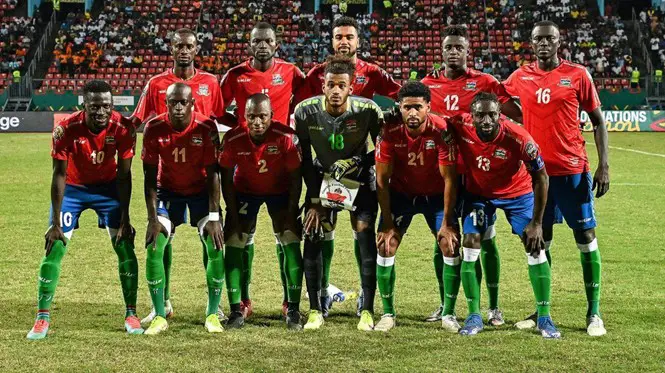Gambia’s hopes of qualifying for the 2025 Africa Cup of Nations came to a disappointing end after a mixed campaign that saw the Scorpions fall short in a fiercely competitive Group A.
Despite flashes of brilliance, including a stunning away win against Tunisia, inconsistency and key setbacks ultimately denied them a place at Africa’s premier football tournament.
Tom Saintfiet’s side faced a formidable path to qualification, drawn alongside traditional continental powerhouses such as Nigeria, Egypt, Cameroon, Tunisia, and Ghana during the broader qualifying campaign.
Yet, it was the battles within Group A, particularly against Tunisia and Comoros, that defined their fate.
The Scorpions turned heads early in the qualifiers when they stunned Tunisia 1-0 in Tunis. A solitary goal from Aboulie Ceesay secured one of the most notable victories in Gambian football history, shaking up expectations and briefly lifting hopes that Gambia could claim a spot in the tournament finals.
Analysts across the continent praised the performance for its discipline and tactical awareness, marking it as a sign of the team’s growth on the international stage.
However, the early promise failed to translate into consistent results. Gambia’s campaign soon became characterised by uneven performances and missed opportunities.
They managed to collect eight points across their group fixtures—enough only for a third-place finish. In a surprising twist, Comoros topped the group with 12 points, ensuring their own qualification at the expense of the Scorpions and other more favoured nations.
The rivalry between Gambia and Comoros emerged as one of the key narratives of the qualifiers. Their initial meeting ended in a 1-1 draw, but it was the return fixture that proved decisive.
A 2-1 defeat to Comoros sealed Gambia’s elimination, drawing criticism and scrutiny over the Scorpions’ approach in crucial matches.
Football experts and former players have since weighed in on the reasons behind Gambia’s missed opportunity. Several pointed to the absence of key players through injury as a major factor, undermining the team’s rhythm and forcing Saintfiet to rely on an unsettled squad throughout the campaign.
Others have questioned some of the coach’s tactical decisions, particularly in high-stakes matches where the Scorpions appeared to lack cohesion and attacking fluidity.
Despite the disappointment, there is a sense of cautious optimism surrounding the future of Gambian football. The national team has shown glimpses of its potential in recent years, including a historic quarter-final appearance at the 2021 AFCON.
Observers believe that with more investment in grassroots development and improved management at the national level, Gambia could soon establish itself as a regular contender in African competitions.
“There’s no denying the talent is there,” one analyst noted. “What’s needed now is the structure to support it—stronger domestic systems, better player welfare, and a clear vision going forward.”
While the Scorpions will not be among the 24 teams in Morocco for AFCON 2025, their campaign has left behind valuable lessons and a renewed determination.
For the Gambia Football Federation and its passionate supporters, the road to redemption begins now—with the long-term aim of building a team capable not just of qualifying, but of making a deep run at future tournaments.











